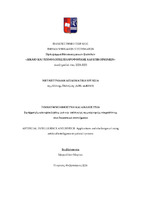Τεχνητή νοημοσύνη και δικαιοσύνη : εφαρμογές και προκλήσεις για την εισαγωγή της τεχνητής νοημοσύνης στα δικαστικά συστήματα

Προβολή/
Λέξεις κλειδιά
Τεχνητή νοημοσύνη ; Δικαστικά συστήματα ; Δικαστές ; Δικηγόροι ; Προγνωστική δικαιοσύνη ; Προγνωστική αστυνόμευση ; Πιθανοί κίνδυνοι ; Προτεινόμενες λύσειςΠερίληψη
Η τεχνητή νοημοσύνη (ΤΝ) συνιστά μία αναδυόμενη τεχνολογία, η οποία σήμερα γνωρίζει ταχύτατη ανάπτυξη και μεγάλη δημοφιλία. Με καταιγιστικούς ρυθμούς η μία είδηση διαδέχεται την άλλη για το πώς η τεχνητή νοημοσύνη κατάφερε κάτι ακόμα πιο καινοτόμο, κάτι ακόμα πιο πρωτοποριακό, κάτι που στο παρελθόν θα εντοπιζόταν μόνο σε λογογραφήματα ή σε ταινίες επιστημονικής φαντασίας. Νέες δυνατότητες προσφέρονται σε όλο το φάσμα της ανθρώπινης δραστηριότητας από την υγειονομική περίθαλψη μέχρι την εκπαίδευση και το Marketing. Δεν θα μπορούσε επομένως, ο τομέας της Δικαιοσύνης να αποτελέσει εξαίρεση και να μην επηρεαστεί και αυτός με τη σειρά του από τις πολλά υποσχόμενες προοπτικές της. Η παρούσα Διπλωματική Εργασία ερευνά ακριβώς τη συμβατότητα και τη δυνατότητα ενσωμάτωσης εφαρμογών τεχνητής νοημοσύνης εντός του πλαισίου της απονομής Δικαιοσύνης και του νομικού οικοδομήματος. Εντοπίζει τα ήδη εφαρμοσμένα συστήματα δικαστικής και νομικής τεχνητής νοημοσύνης και αναλύει τις αλλαγές που μπορεί να επιφέρουν στη συλλογή των αποδεικτικών μέσων, στο δικηγορικό επάγγελμα, στο θεσμό του δικαστή καθώς και στην λήψη των δικαστικών αποφάσεων. Διωκτικές και προανακριτικές αρχές, Δικηγόροι και Δικαστές εξετάζονται παράλληλα, καθώς από κοινού αποτελούν τους εγγυητές της ορθής απονομής δικαιοσύνης. Ακόμα, η παρούσα διπλωματική εργασία αναλύει τις ηθικές και νομικές προεκτάσεις της χρήσης εφαρμογών τεχνητής νοημοσύνης στη Δικαιοσύνη, τους κινδύνους που αυτή ελλοχεύει, ενώ προτείνει και λύσεις προκειμένου αυτή να καταστεί δυνατή. Κυρίως όμως, εξετάζει το κατά πόσο η εισαγωγή τους μπορεί να είναι πράγματι συμβατή με το κράτος δικαίου, την θεμελιώδη αρχή της δίκαιης δίκης και τα ανθρώπινα δικαιώματα όπως τα αντιλαμβανόμαστε μέχρι σήμερα.


